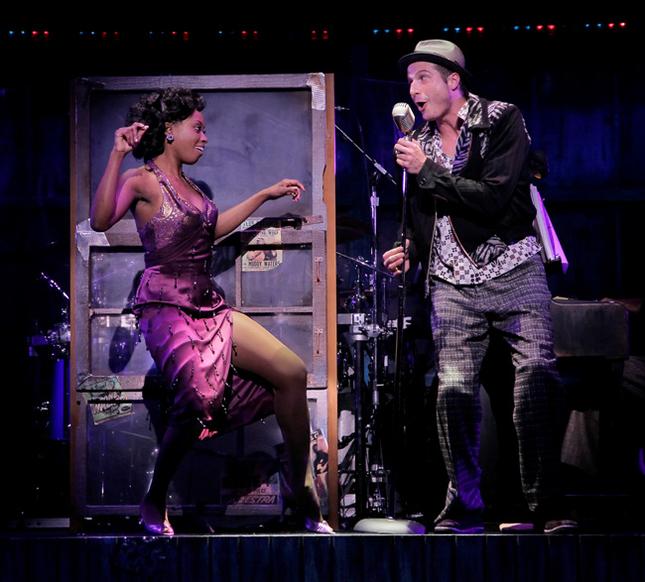Pre-Elvis ‘Memphis’: Darrington’s Delray
By • June 29, 2012 0 1438

On stage, Delray—the owner of a black underground music bar in Memphis, circa 1951—paces the floor with an eye out for trouble. His sister is on the stage, singing sassy and soulful blues numbers, and all male eyes in the joint are on her, and Delray’s eyes are on them. Delray is an imposing guy. He’s a little scary a times, a serious man who hides his soft spots well, a balled fist at his side.
Delray is one of the mainstays and main characters in “Memphis,” a loud, electric, fast-paced, high-energy Tony-Award winning musical now on its Washington stop through July 1 of a national tour at the Kennedy Center’s Opera House, trying and succeeding in bowling over by its sheer force of energy. Delray is pivotal to the proceedings, which involve a goofed-up young white man named Huey and his discovery of rhythm and blues evolving into the coming of rock and roll—and his discovery of Delray’s sister, Felicia, with whom he’s smitten. Delroy fumes, he doesn’t like it, you can practically see his eyebrows bristles, his fist clench tighter.
Quentin Earl Darrington, who plays Delray understands the man. “I know what he’s about doesn’t mean I’m him, but I know where he’s coming from,” said Darrington, a personable, passionate-about-theater man. “This is the South. You can’t do certain things. There are race laws, and this is termed race music by white people. So, he’s suspicious, especially of a white man getting sweet on his sister.”
Darrington is a serious guy, serious about his role as an actor, about being on stage, about being on the road, about race and economic and racial divides in the country, about his responsibilities—and the joys thereof—of being the father of three young boys, about his future.
Like many young boys who idolize their kin, Darrington wanted to be a football player like his brother but instead started getting into acting at the high school he attended in Lakeland, Fla. “Mr. Hughes, my teacher, he stuck by me, encouraged me,” he said. “My folks weren’t that keen on the idea.”
“This show, it’s more than just about the music,” he said. It’s about the times, how music figured in all of that, how it burst out onto the national scene. There really was a guy like Huey who was a local deejay here in Memphis who played our rhythm and blues and rock and roll. He had a TV show, and he was a forerunner, like the guy who discovered Elvis and Dick Clark in Philadelphia. The music was jumping out and it was important because it brought people together, whether they liked it or not.”
Darrington is coming back to the Kennedy Center and the memories of his last trip here were all good. He had the stirring, difficult role of Coalhouse Walker in the Kennedy Center-mounted production of “Ragtime,” a second-go at the musical version of E.L. Doctorow’s novel about America on the move into modernity in the early 1900s. Walker was a man with a mission, he wanted to marry the woman he loved, he was a charistmatic man with huge pride and style, he wanted to show off his Model T, he wanted to do good and shine in the world, until his run with some New York firemen totally changes his life.
“That was such a great experience, such a game-changer for me,” Darrington said. “It was a big role, but it was complicated. You had to think about his life, and your own life, and what he wanted and the country. It makes you grow, it made me grow, and going to Broadway with it was absolutely terrific. You know, it’s the kind of thing that really made you think, about who you are and what kind of man you want to be.”
One of the things he wants to be is a good father, the best father. He’s used to the road and uses it—to reach out to the communities, where “Memphis” is playing, and take part, but he wants to stay close to his children.
“You’ve got to think about things like that,” he said. “I love acting, what I do, who I am, but you’ve got to think of other things, too. And the stage—you’ve got to expand. Coalhouse in “Ragtime” made him think about that. “It’s funny. I think about him almost every day, he comes to mind a lot.” Darrington thinks a lot about going back to school, which he plans to do next. “I want to teach others someday,” he said. “I want to open doors, for myself and others.”
Meanwhile, Delray paces the stages, his fists clenched.
“Memphis” will be at the Kennedy Center’s Opera House through July 1.

